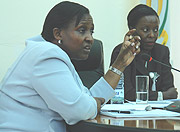•Says it’s ill intended •Urges UN to disown it The government Monday strongly ridiculed the UN experts’ report alleging that Rwanda supports the National Congress for the Defence of the People (CNDP), a rebel movement operating in the Eastern Democratic Republic of Congo (DRC).


•Says it’s ill intended •Urges UN to disown it
The government Monday strongly ridiculed the UN experts’ report alleging that Rwanda supports the National Congress for the Defence of the People (CNDP), a rebel movement operating in the Eastern Democratic Republic of Congo (DRC). It says it was full of dangerous inaccuracies, was ill-intended and contained a lot of misinformation.
In a news conference held at the Prime Minister’s office yesterday, the ministers of Information and that of Foreign Affairs, said the report was "a calculated move aimed at shifting blame away” from the DR Congo government and the International Community’s failures, in resolving the eastern DR Congo conflict.
"Both have failed to resolve the conflict in eastern DRC despite numerous bilateral, regional and international initiatives in the last fourteen years,” Information Minister Louise Mushikiwabo said.
"It is also a dangerous balancing act that attempts to balance the activities of FDLR and CNDP while endeavouring to prove a link between the government of Rwanda and the latter,” added Mushikiwabo, who is also the government spokesperson.
The government officials gave an example of paragraph 29 of the UN report where the experts acknowledge their inability to corroborate "those allegations” yet go ahead to claim that CNDP receives shipments of ammunition through neighbouring countries, including Rwanda.
"Their lack of evidence is a clear testimony of the complete lack of professionalism and bad faith that characterize the reporting on Rwanda,” said Rosemary Museminali, the Foreign Affairs Minister. She wondered how Rwanda could knowingly stamp the alleged captured army uniform with its own flag.
"It would be illogical for any government to supply uniforms with its national flag to a rebel group, as referred to in paragraph 27.”
The same paragraph claims that several shipments of military fatigues to the rebels from Rwanda have taken place, and points to Bunagana, a border crossing between Uganda and the DRC.
"We don’t share a common border with DRC at Bunagana,” Museminali pointed out.
In paragraph 61, the experts claim to have investigated and found evidence that Rwandan authorities have been complicit in the recruitment of soldiers, including children, and facilitated the supply of military equipment, and have sent officers and units from the Rwandan Defense Force (RDF) to the DR Congo in support of CNDP.
Surprisingly, however, the subsequent paragraph gives this claim little or no credibility.
"Given the nature of the support, there is little documentation available to prove Rwandan material support to CNDP,” reads part of paragraph 62.
"The government of Rwanda notes that even the implied - little evidence - implicating Rwanda is not substantiated as it is premised on allegations resulting from hearsay, perceptions and stereotypes in a strategy meant to justify the failures of the international community,” Mushikiwabo said.
While expounding on the report’s "inaccuracies, Museminali strongly refuted the charges over complicity by Rwandan officials in the recruitment.
"The UN is aware that in accordance with the Nairobi Joint Communiqué, Rwanda put up stringent measures to prohibit any form of support to CNDP from the Rwandan territory,” she said, adding that the UN experts knew that but continued to forward "wild allegations.”
Museminali also refuted the alleged CNDP financing, saying government has never refused the experts access to any required information concerning the matter.
"The government would appreciate receiving from the group of experts any evidence linking the alleged bank accounts to CNDP.”
The ministers recommended that the UN disowns "the unfounded allegations” against Rwanda, and instead fully engage in supporting on-going initiatives to resolve the conflict in the region.
Ends


